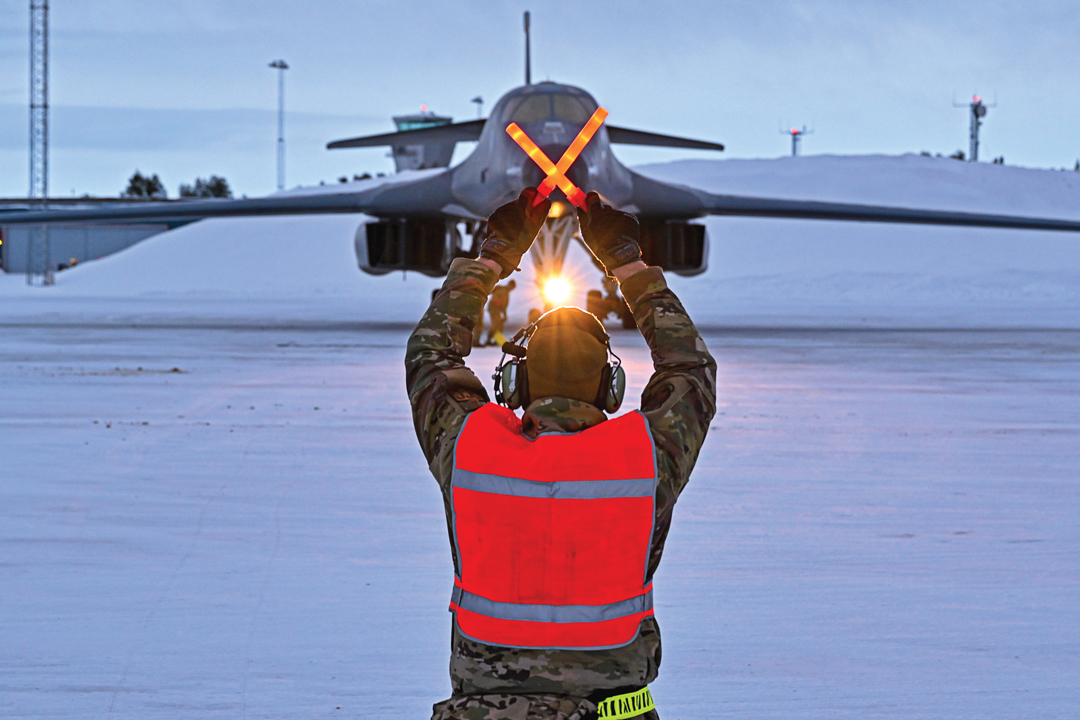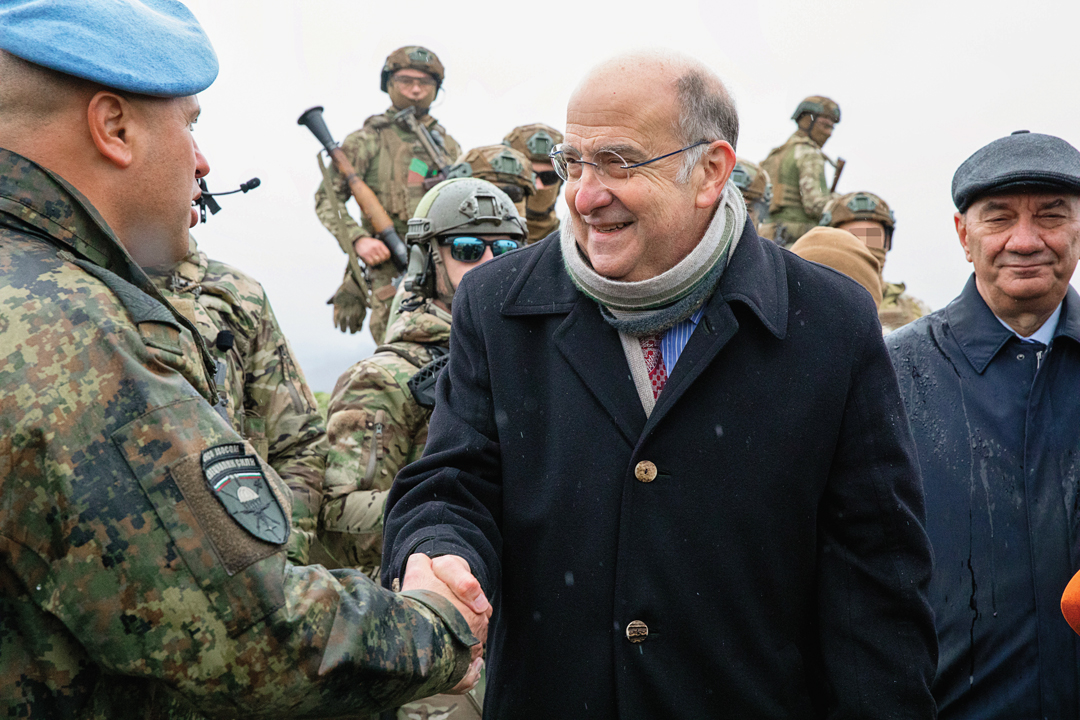Large Scale Global Exercise 2024 Demonstrates How the U.S. and its Partners Work Together to Project Power, Deterrence
By per Concordiam Staff
When U.S. Army Gen. Christopher G. Cavoli addressed a security forum in Sweden on January 9, 2023, he shared his observations on how Russia’s “illegal, unprovoked, brutal invasion” of Ukraine overturned European security from the moment that Moscow’s first missiles struck near Kyiv before dawn on February 24, 2022.
“It has forced us to recognize the imperative of collective territorial defense and that has fundamentally changed our [NATO] Alliance posture,” said Cavoli, commander of United States European Command (EUCOM) and the Supreme Allied Commander Europe.
As for the approach needed for deterring potential aggressors — whether it be Russia or another global threat? Cavoli was unequivocal: “Hard power is a reality.”
“If the other guy shows up with the tank … you better have a tank,” he said.
To better wield that hard power, Cavoli said the U.S., along with its Allies and partners, must modernize and focus on “larger scale [military] exercises that are centered on collective defense.”
In a 2018 NATO Defense College book, “Military Exercises: Political Messaging and Strategic Impact,” Beatrice Heuser and Diego Ruiz Palmer wrote that such events play a “deterrence-signaling role” to potential adversaries.
They wrote: “Of all the tools of statecraft used by political leaders and military brass, holding exercises is one of the most effective. Operating in unison during peacetime conveys solidarity among exercise partners; it implies that if deterrence fails, allies and partners will fight together and do so more effectively given better interoperability and command and control relationships.”
Nothing embodies that concept more than Large Scale Global Exercise 24 (LSGE 24).
LSGE 24, which took place from February to June 2024, was coordinated by EUCOM in collaboration with its fellow U.S. combatant commands. It included nearly 30 exercises, involved 90 nations, flexed military muscle and enhanced interoperability between Allies and partners.
“Our commitment to peace and security not only here in Europe, but throughout the world, is unwavering,” EUCOM’s deputy commander, U.S. Air Force Lt. Gen. Steven Basham, said in a February 16 news release. “Large Scale Global Exercise 24 is another opportunity to showcase our commitment and resolve while demonstrating our readiness to respond to any security challenge.”
Now, more than a year after Cavoli’s speech in Sweden, Stockholm has joined Finland as NATO’s newest members and Russia’s ongoing war in Ukraine has refocused the military exercises of the U.S. and its Allies and partners.

A GLOBAL UNDERTAKING
LSGE 24 was the third iteration of an integrated series of all-domain exercises. It brought together forces and commands from across the globe, displaying the interoperability and enduring partnerships between the U.S. and its Allies and partners. The nations involved in Allied Spirit alone — the first EUCOM event of LSGE 24 — included Croatia, Denmark, Germany, Hungary, Italy, Lithuania, the Netherlands, Spain, the United Kingdom and the U.S.
“Now, more than ever, this shared resolve is absolutely critical,” Brig. Gen. Steven Carpenter, who leads the U.S. 7th Army Training Command, said in a February 26 EUCOM news release. “Allied Spirit is a strong symbol of that ongoing relationship.”
Members from all branches of the U.S. armed forces participated in the multinational endeavor. Of LSGE’s events, 11 took place in the EUCOM area of responsibility. In addition to Allied Spirit, those exercises included Trojan Footprint, Nordic Response, Arctic Shock, Saber Strike, Immediate Response, Swift Response, Astral Knight, BALTOPS, and two iterations of Bomber Task Force. In all, the global activities ranged from U.S. B-1B Lancer strategic bombers training alongside Swedish warplanes, to multinational naval activity in the Baltic Sea and exercises in South Korea involving Australian, Japanese, Korean and U.S. forces.
In addition, LSGE 24 complemented Steadfast Defender 2024 — the largest NATO exercise since the Cold War, according to a January 25 story from the U.S. Department of Defense (DOD). Steadfast Defender, which ran from January to May, included more than 90,000 troops from all 32 NATO Allies.
“The alliance will demonstrate its ability to reinforce the Euro-Atlantic area via trans-Atlantic movement of forces from North America,” Cavoli said at the time, according to DOD News. “Steadfast Defender 2024 will be a clear demonstration of our … determination to protect each other, our values and the rules-based international order.”
STRATEGIC COMPETITORS
The protection of the global rules-based order has become even more critical as strategic competitors seek to expand their influence — and their territories — in regions such as the Arctic and the South China Sea.
“The most important challenge facing the United States in the 21st century is the rise of the powerful and increasingly authoritarian — if not totalitarian — states of China and Russia,” wrote James Van de Velde in a February 2024 analysis in The SAIS Review of International Affairs.
That challenge, of course, also applies to U.S. Allies and partners, which makes endeavors such as LSGE 24 crucial.
Something else to point out: These authoritarian adversaries also conduct exercises together. In February 2022, PRC leader Xi Jinping and Russian President Vladimir Putin announced a “friendship without limits” at a Beijing meeting.
The People’s Republic of China (PRC) considers joint exercises integral to its foreign policy, according to a June 3, 2023, story in The Diplomat magazine. China has taken part in Russia’s annual military exercises. The two nations have also conducted joint naval drills as well as air patrols in the Sea of Japan and East China Sea. China and Russia have also held naval drills with Iran in the Gulf of Oman and the Arabian Sea, most recently in March 2024, according to Reuters.
In the NATO Defense College book, Heuser and Palmer wrote that military exercises serve both political and strategic purposes. “(They) take place in the grey area between peace and war. … Their design and planning nearly always requires some form of strategic or foreign policy calculus.”
So, what is that calculus for the PRC and Russia?
“Russia and China are trying to convey to Japan and the U.S. that they are very unhappy with their cooperation in NATO and the [Indo-Pacific] region, and they want to prove that they can achieve the same level of cooperation in the region as [Washington and its Allies,]” Stephen Nagy, a regional security expert at Japan’s International Christian University, told Voice of America news in a July 20, 2023, story.

POWER IN PARTNERSHIPS
The 2022 National Defense Strategy of the U.S. asserts that effective deterrence requires the consideration of how strategic competitors perceive the combat capabilities and commitment of the U.S. and its Allies and partners.
To that end, LSGE 2024 — “where strength meets unity,” according to a EUCOM public affairs video, demonstrated multinational interoperability and the means to counter adversaries on multiple fronts and in all domains.
During a 2023 exercise in Latvia, U.S. Army Lt. Col. Eric Evans succinctly summed up how the unique capability of U.S. forces to integrate with their Allies and partners provides a strategic advantage.
“We won’t have to ask the new guy questions,” Evans said in a U.S. Army news release. “We become combat-credible much more quickly because we don’t go through a combat power build phase.
“We arrive … and we’re truly ready to fight.”


Comments are closed.